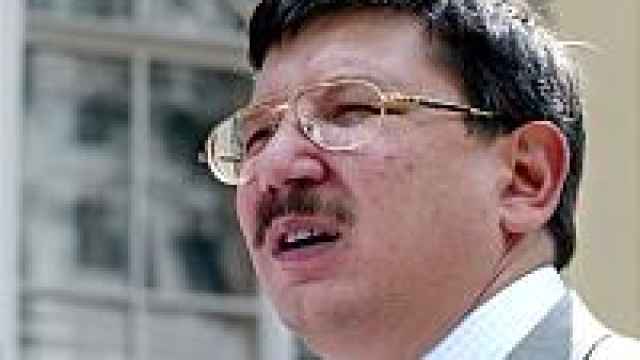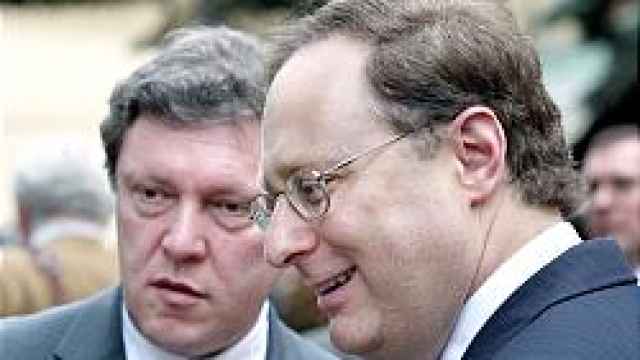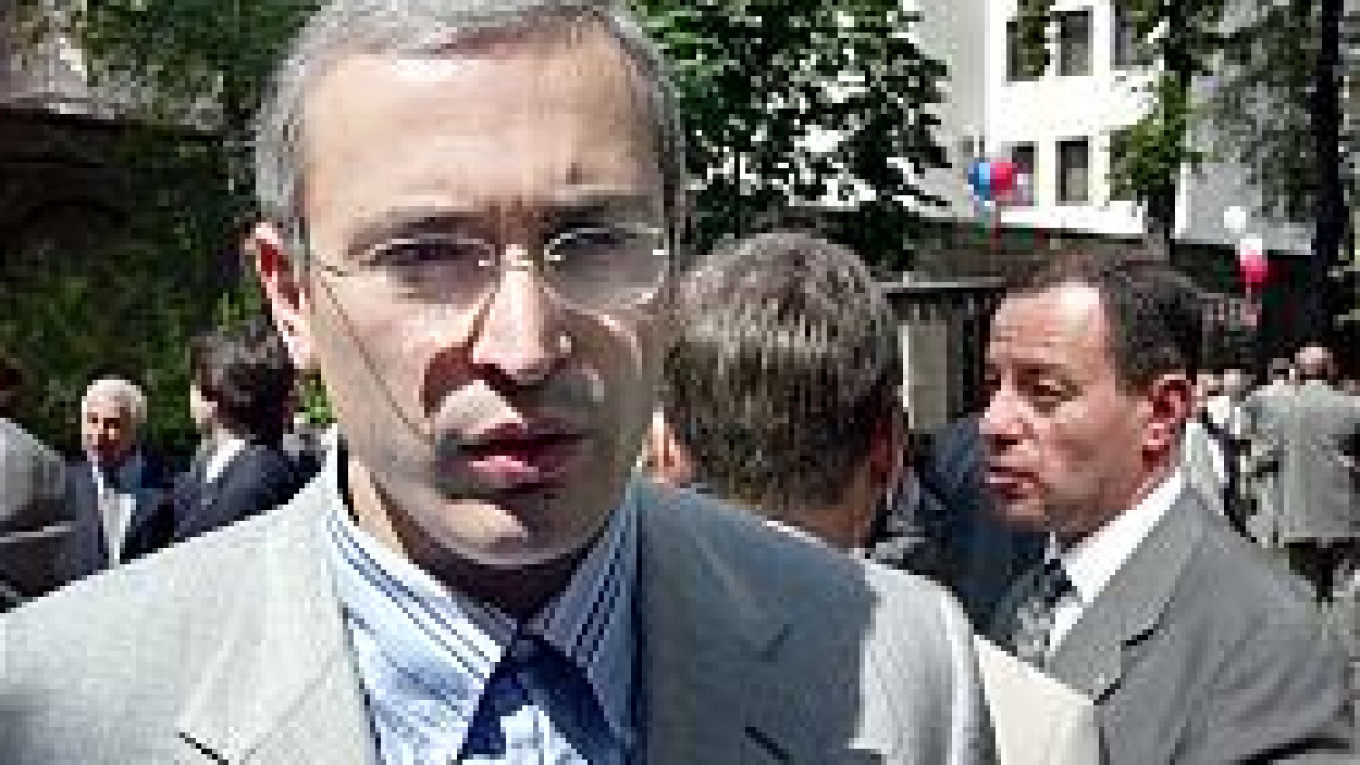As prosecutors continued to aggressively pursue the case, it was widely seen as having little to do with enforcing the law and a lot to do with punishing Yukos CEO Mikhail Khodorkovsky for his political activities.
Lebedev, 43, was arrested Wednesday and accused of large-scale fraud in a case dating back to 1994. The court upheld the charges Thursday. Also Wednesday, the prosecutors announced they had brought murder charges last week against the head of Yukos' economic security department, Alexei Pichugin.
Khodorkovsky and his No. 2, Leonid Nevzlin, were ordered to appear Friday at the Prosecutor General's Office, a Yukos source said Thursday evening.
On Thursday, with Lebedev's arrest still causing shock waves, Khodorkovsky showed up at an Independence Day party thrown by U.S. Ambassador Alexander Vershbow and his wife at Spaso House for hundreds of diplomats and others.
Khodorkovsky seemed to hold out hope that the case would be closed. "[The arrest], as I see it, is not a legal issue. I hope that the leadership of the country will give it the right assessment," he said in an interview.
Over the past months, Khodorkovsky has branched out into politics. He has openly said that he is funding the Union of Right Forces and Yabloko and that another member of the Yukos board is funding the Communists. The buzz has been that he wants to make sure he can count on the support of up to half of the State Duma deputies who are elected in December.
Khodorkovsky went too far to the right and to the left, instead of supporting the pro-Kremlin centrists or just staying away from politics all together, said Yevgeny Volk, director of the Heritage Foundation's Moscow office.
"In the Soviet gulag system there was a rule: A step to the right or a step to left are considered an escape attempt and thus are immediately followed by a gunshot," Volk said.
Boris Nemtsov, leader of the Union of Right Forces faction in the Duma, agreed that it was Khodorkovsky's political activities that motivated the case against Lebedev.
"This is revenge for Yukos management's intention to increase its presence in the political processes," Nemtsov was quoted by Interfax as saying.
In commenting on Lebedev's arrest, Communist Duma Deputy Viktor Ilyukhin showed rare unity with the liberals.
"It was made understood to Khodorkovsky that the government and the president have one party that they want to support, and that there is no need to show initiative toward the parties whose presence in the Duma is unwanted," Ilyukhin said on Ekho Moskvy radio Thursday.
 Vladimir Filonov / MT Sergei Generalov was Yukos' CFO from 1993 to 1997 | |
Lebedev had been ordered to come into the Prosecutor General's Office for questioning at 10 a.m. Wednesday, but in the early hours of the morning he felt unwell and was taken to a hospital.
His lawyer rescheduled the questioning for Thursday. Deciding not to wait, prosecutors came to his hospital room at 4 p.m. Wednesday and took him away in handcuffs. After questioning he was put in the Federal Security Service's Lefortovo prison, Khodorkovsky said.
He is accused of defrauding the state of $280 million in the purchase of a 20 percent stake in the Apatit fertilizer producer in 1994. If convicted, he could be sentenced to up to 10 years in prison.
The clouds over Khodorkovsky's head began to gather months ago.
More recently, Kompromat.ru, a monthly glossy specializing in digging up dirt on prominent politicians and businessmen, dedicated its entire June issue to Khodorkovsky and other leading figures within Yukos. Titled "Who Is Mr. X," a play on the first letter of Khodorkovsky's name in Cyrillic, the issue was almost entirely banned from distribution by a court order, at Yukos' request.
But more significantly, President Vladimir Putin, during a meeting with the oligarchs in February, delivered what seemed to be a warning to Khodorkovsky, hinting that there was reason to look back at how the oil majors accumulated their assets.
This particular line was delivered after Khodorkovsky disputed the legality of state-owned Rosneft's acquisition of medium-sized crude producer Severnaya Neft from Senator Andrei Vavilov.
During a nationally televised press conference in June, Putin denied a report circulating on the Internet that warned of an impending "oligarchic revolution" that would turn Russian into a parliamentary republic. He said the oligarchs had all been pushed away from the corridors of power (despite evidence to the contrary).
"Over recent years the much-discussed equi-distance from the organs of power has finally been achieved," Putin told journalists.
"Today, those who disagree with this position are, as they say, long gone," he said, referring to the exiled Boris Berezovsky and Vladimir Gusinsky.
The case against Lebedev has been handled by the same investigative team that was in charge of the arrest of Gusinsky, the founder of NTV television, in the summer of 2000.
 Vladimir Filonov / MT U.S. Ambassador Alexander Vershbow chatting with Yabloko leader Grigory Yavlinsky at Spaso House on Thursday. | |
Khodorkovsky is less willing to fight the Kremlin and less willing to give up his business empire, and thus he and Lebedev may walk away from the current standoff relatively unhurt, Ryabov said.
But the situation itself is telling and ominous, he said. "It is the moment of truth. For as long as big businessmen are working quietly and supporting the forces that need to be supported, everything is fine," Ryabov said. "But for the man who decides to get into political life, there are immediately problems with 1994."
Sergei Generalov, a former fuel and energy minister who was Yukos' chief financial officer from 1993 to 1997, was also among the guests at Spaso House on Thursday. He said Lebedev's arrest was not the message Russia wants to send to foreign investors.
"I hope the authorities have enough sense to understand that this is bad for Russia's image," said Generalov, now a Duma deputy in Nemtsov's faction.
He said the Duma is working on legislation that would provide a statute of limitations of 10 years for privatization deals.
A Message from The Moscow Times:
Dear readers,
We are facing unprecedented challenges. Russia's Prosecutor General's Office has designated The Moscow Times as an "undesirable" organization, criminalizing our work and putting our staff at risk of prosecution. This follows our earlier unjust labeling as a "foreign agent."
These actions are direct attempts to silence independent journalism in Russia. The authorities claim our work "discredits the decisions of the Russian leadership." We see things differently: we strive to provide accurate, unbiased reporting on Russia.
We, the journalists of The Moscow Times, refuse to be silenced. But to continue our work, we need your help.
Your support, no matter how small, makes a world of difference. If you can, please support us monthly starting from just $2. It's quick to set up, and every contribution makes a significant impact.
By supporting The Moscow Times, you're defending open, independent journalism in the face of repression. Thank you for standing with us.
Remind me later.


